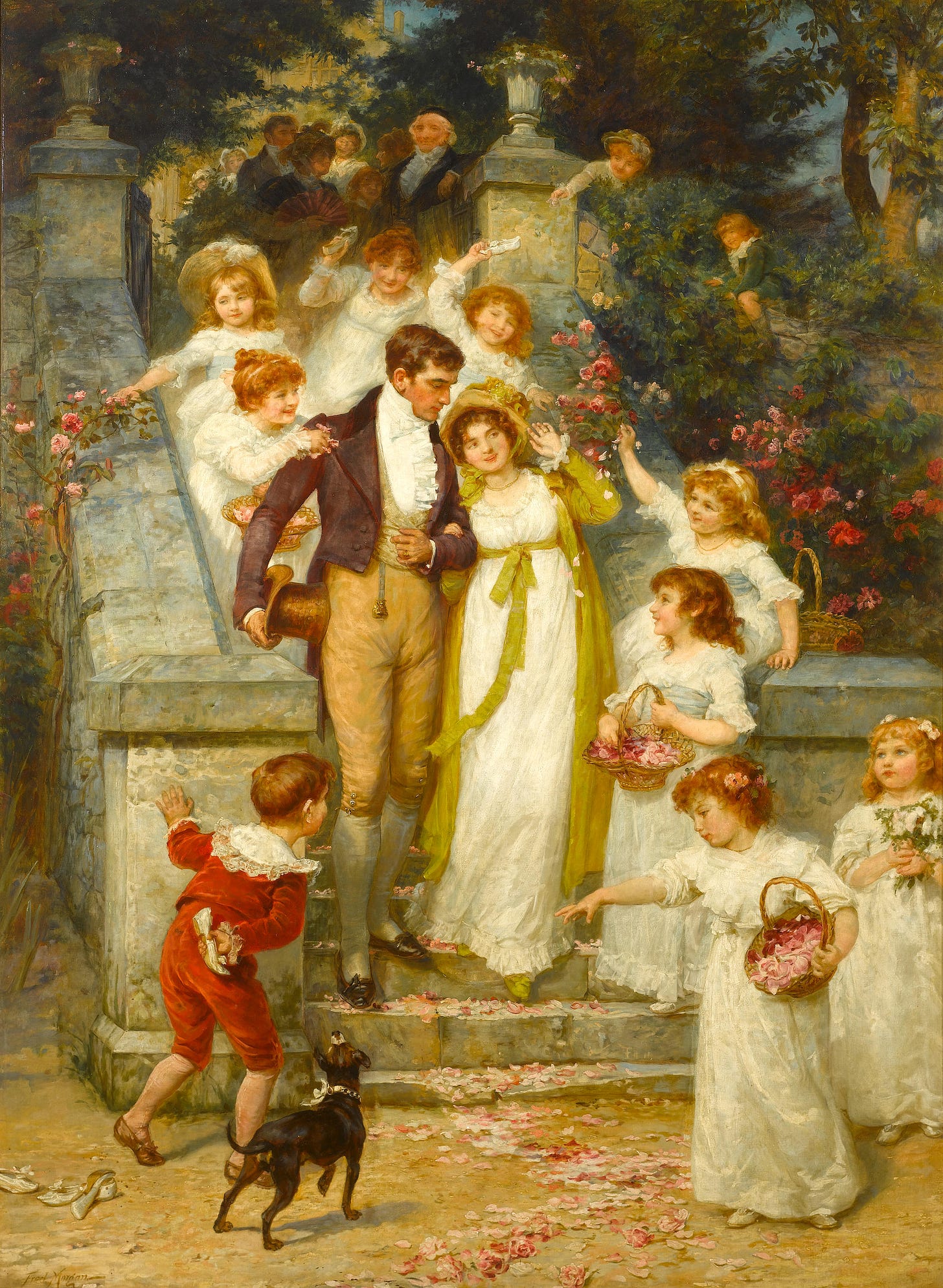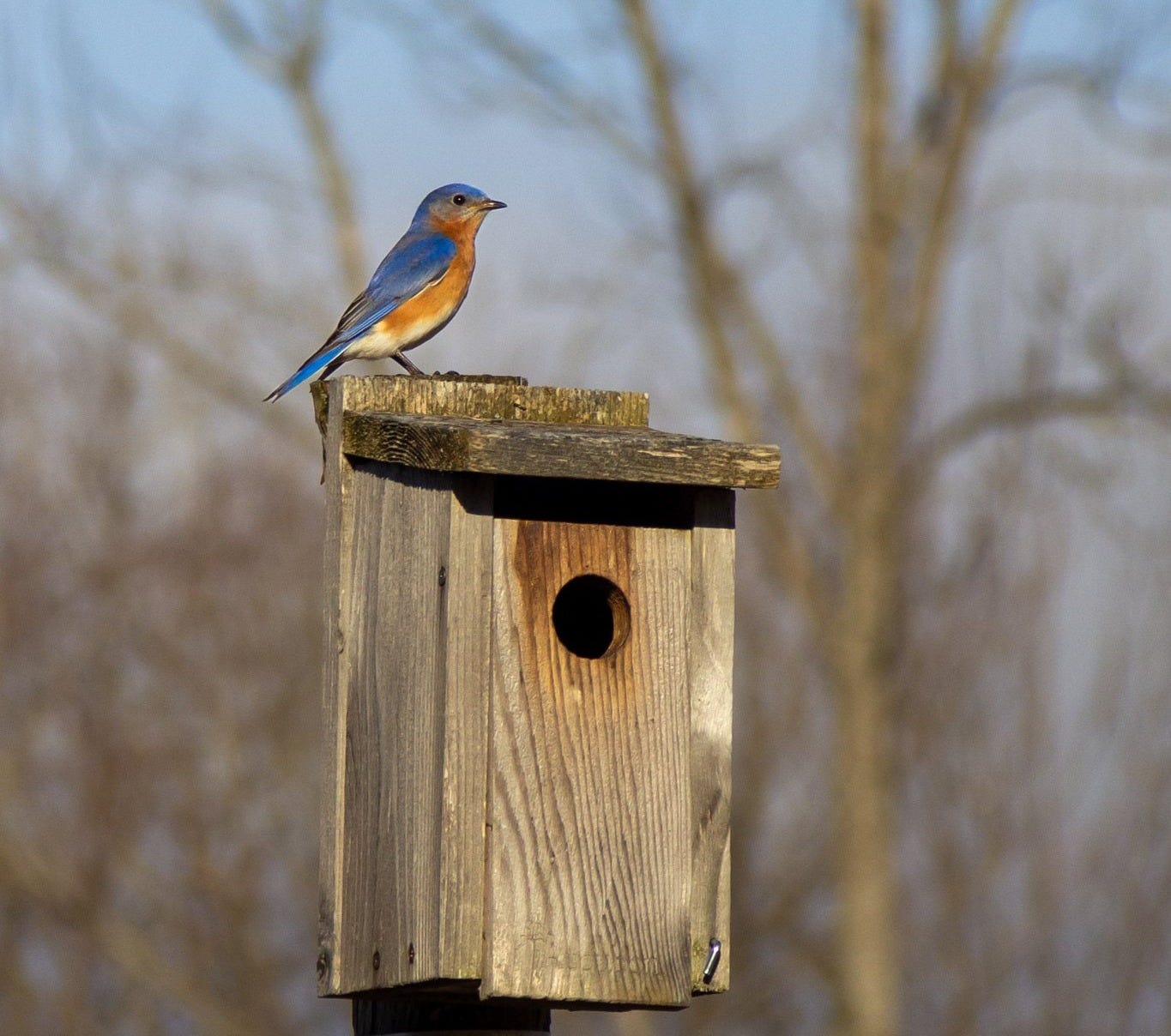Here in the meadow, May brings song. The bluebirds have staked their claim to the birdhouse by the old hay rake. They dart about, from the iron to the little house to the forest and back again. Their low-pitched warble signals a courtship and the promise of return next year following another long winter; four notes that implore “Now, come hither!” Promise manifest. The tree frogs however have begun to quiet their courting songs; dusk brings a quieter chorus at the woodline than it did even a week ago. The frogs are settling in. They have found their mates. Amongst it all, amid all the songs lilting and fading, there are those in the meadow and among the hedgerows bearing earnest witness to the oaths declared and the songs of celebration:
The children.
They are there signing their own little songs learned in playgrounds and in their mothers’ arms at bedtime after long May days of scraped knees, bug bites, and dandelion picking. While we adults hang our heads in our hands, weighed down by all manner of modernity’s artificial anxieties, they are watching the birds flit about calling to one another, they are listening to the mystery of the dusk-song from the trees. They are present, fully and freely, in the perennial pattern of the seasons, of the goodness of the world.
It is a wonder then, in this season of matrimony, that we have begun to exile them from our weddings.
There is a concerning trend of weddings, once a rite that wove together families and futures, having become something curated and adult-only, sterilized of giggles during the vows, of small hands dropping petals, of the accidental holiness of a child falling asleep in a pew. The child, who once danced between tables and yanked at Grandpa’s tie, is now unwelcome, a perceived interruption to the ambiance.
We say it's for simplicity. For elegance. We convince ourselves we’re doing it so the parents can have a night off. In truth though, it is grim reflection of a deeper discomfort with which we have not reckoned. It is a cultural abandonment of inheritance, of challenge, of continuity. In leaving out the children from our hallowed rite, we leave out the very ones to whom the promise is meant to extend. We blind those whose witness is most unselfconscious, most earnestly given.
One can read the lifestyle articles, the blogs, the various defenses of this practice. They are well-intentioned. The defenders of childfree weddings will point to a sense of preserving the special moments, make the case that children are not well suited for formal events, and expecting them to remain quiet and composed throughout a wedding is unrealistic.
Perhaps the problem is the expectation itself. Perhaps the disruption is the point.
It is often said that if a parish never hears the occasional cry of a baby or the chatter of a toddler during Sunday Mass, it is a parish on the brink of death. It is a grim but clarifying reminder that we are always but one generation away from losing the values, traditions, and promises we do not pass down. Whether or not you are religious, this principle applies. A wedding is about continuity. There is deep comfort in knowing that when your love matures, when your parents are gone, when the blush of youth gives way to gray and to gravity, there will be young adults in your life who will remember something essential about you.
They will remember that you made a vow.
They, as children, may not remember the details of your vows. They will not remember what you said. They will remember that you took them however. They will remember that magical words that bound you to another were exchanged. They will remember that something sacred happened.
This memory becomes a compass, a north star, for both them and you. These future young adults are not your peers who may succumb to the same societal pressures, trends, and pitfalls you do; they have a different perspective, a cultural antibody you do not possess. They will not fall in the same way you do. This is invaluable in holding you accountable, in keeping you true. They benefit as well. As they bear witness to your oath, they begin to craft a story they will carry into their own tangled seasons of adulthood. A story that can guide them when our wounded world inevitably tells them that commitment is naïve, irrational, or even disposable.
The children need to hear your vows.
An argument for childfree weddings we often hear is that they are both costly and deeply personal, that it is a day entirely focused on the happy couple and therefore their wishes are paramount. It should be about them. Yes, weddings require immense effort, planning, and sacrifice. They are charged with emotion, with meaning, with the uniqueness of a couple’s story.
However they are not exclusively yours.
This is jarring to our individualistic and owner-oriented western sensibilities, but a wedding, no matter how tailored or costly, is not a curated expression of self. It is a public act of union, a covenant made in the presence of others. To exclude an entire population from that witnessing, especially the youngest and most vulnerable among us who carry the future of that community, is to diminish the very nature of the union. As a brief but serious aside, we also need to ask ourselves plainly why is it only children we feel free to exclude? Try substituting any other group: “No one over sixty, too disruptive you know.” “Not for those earning under $100,000 a year. Too risky.” The suggestion is absurd. Offensive, even. Yet with children, we’re comfortable saying they’re too risky, too noisy, too inconvenient. Why? Ask yourself and you will find an uncomfortable answer.
Regardless, here lies the heart of the matter: weddings, while personal, are not private performances. Ultimately, a union made without witnesses becomes something fragile. A union seen, remembered, and carried by others is more enduring. It lasts.
This exclusion points to a deeper cultural malaise. It is not quite selfishness, but it something close. Perhaps it is a kind of compartmentalization, or a form of toxic individualism, where even our most sacred rites are folded into the logic of consumer choice and personal branding, of identity. When every aspect of the day is curated down to color palettes and filtered lighting, the messy, holy reality of life, the surprise laugh, the toddler’s shriek, the communion that spans generations, is treated as an inconvenience. A wedding is not a brand extension however. It is not a performance. It is a deeply human and hallowed rite. It is a sacrament rooted in something older than trend, older than taste. It is not about control. It is not about ambiance. It is not, ultimately, about you.
It is about your union and the people who will hold you to it. The ones who will remind you, decades from now, what you promised. The ones who will grow up remembering they saw something sacred, something good, something worth aspiring to. When we invite children to our weddings, we invite the future to bear witness.
That is worth a little noise. It is worth a little song.







Thank you for writing this. I got married young, only 23, and in my haste to make the occasion feel more grown up, I told my mom that I didn't want any children there besides my young cousins who served as flower girls. Thank goodness she was wise enough to tell me that the day wasn't just about my groom and me. It was for our loved ones to celebrate our covenant, to dance with us, and celebrate us, and witness what it means to be together as a family.
This is a timely tender spot for me- we just were invited to a wedding, but not the kids. Now, none of us can go to support them (far away, no overnight childcare where we live). I said the same thing, would they ever think to exclude their elders who"could fall"? No. I feel wounded by the exclusion. I appreciate you highlighting this in a beauty-focused way. Your writing style reminds me of Tad Hardgrave, do you know his work?